International Trade Law Assignment: Case Studies and Analysis
VerifiedAdded on 2022/09/11
|9
|2203
|12
Homework Assignment
AI Summary
This assignment analyzes two case studies within the realm of international trade law. The first case examines a dispute between a Danish buyer and a German seller regarding the sale of live sheep, focusing on issues of conformity, timely notice, and the application of CISG articles 38, 39, and 40. The buyer argues a lack of conformity and refuses payment, while the seller sues for the full price. The second case involves an Australian chocolate retailer (Chokoland) and a Swiss chocolate supplier. It explores contractual obligations, Incoterms 2010, and the roles of various parties in international transport, including Global Foods, Atafood, Zhong Toy, and a freight forwarding company. Key issues include delayed delivery, damage, and the allocation of liabilities and rights under CISG article 31. The assignment highlights contractual relationships, commercial implications, and remedies for damages, emphasizing the importance of adhering to contract terms and the potential for compensation in cases of mismanagement or breaches of contract.
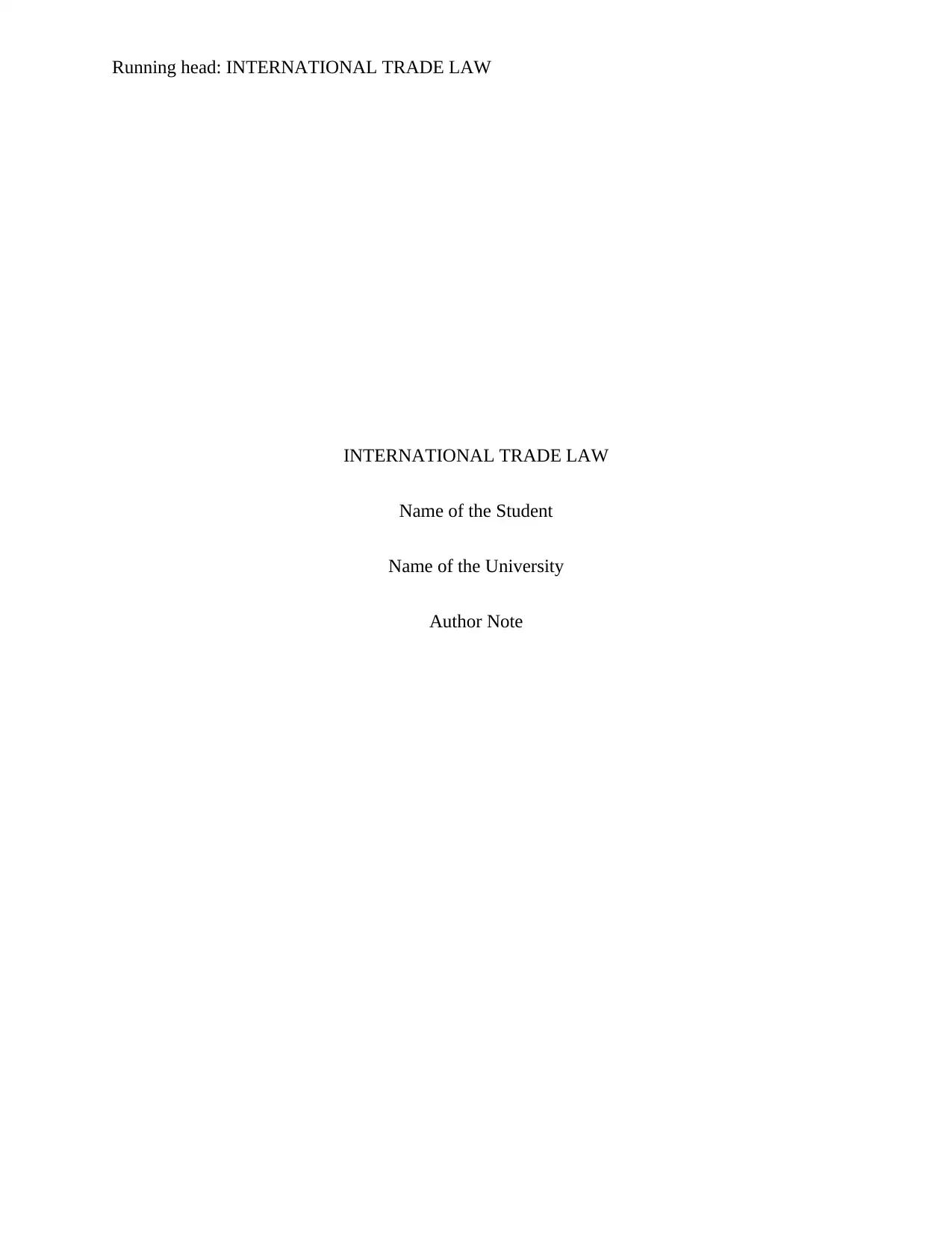
Running head: INTERNATIONAL TRADE LAW
INTERNATIONAL TRADE LAW
Name of the Student
Name of the University
Author Note
INTERNATIONAL TRADE LAW
Name of the Student
Name of the University
Author Note
Paraphrase This Document
Need a fresh take? Get an instant paraphrase of this document with our AI Paraphraser
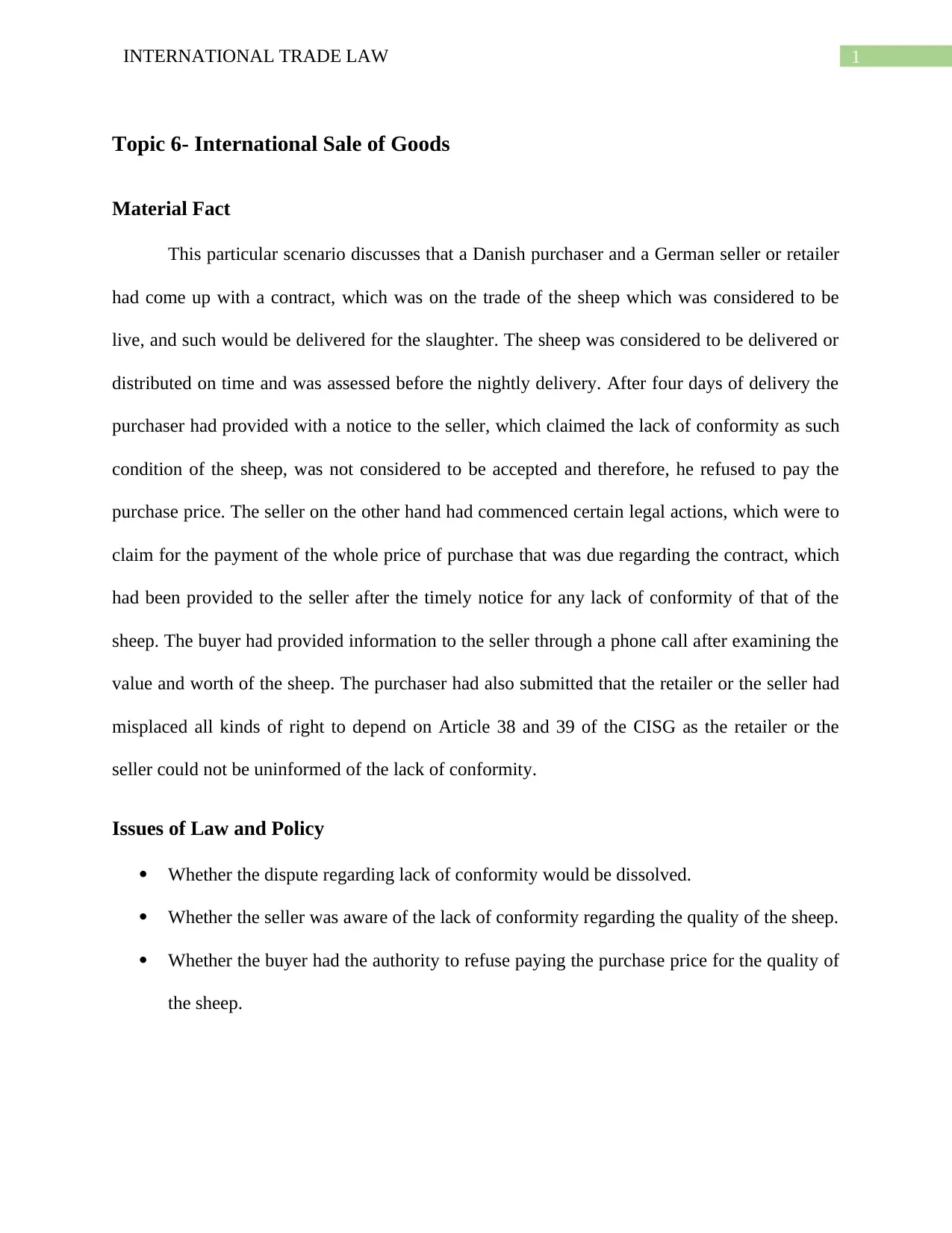
1INTERNATIONAL TRADE LAW
Topic 6- International Sale of Goods
Material Fact
This particular scenario discusses that a Danish purchaser and a German seller or retailer
had come up with a contract, which was on the trade of the sheep which was considered to be
live, and such would be delivered for the slaughter. The sheep was considered to be delivered or
distributed on time and was assessed before the nightly delivery. After four days of delivery the
purchaser had provided with a notice to the seller, which claimed the lack of conformity as such
condition of the sheep, was not considered to be accepted and therefore, he refused to pay the
purchase price. The seller on the other hand had commenced certain legal actions, which were to
claim for the payment of the whole price of purchase that was due regarding the contract, which
had been provided to the seller after the timely notice for any lack of conformity of that of the
sheep. The buyer had provided information to the seller through a phone call after examining the
value and worth of the sheep. The purchaser had also submitted that the retailer or the seller had
misplaced all kinds of right to depend on Article 38 and 39 of the CISG as the retailer or the
seller could not be uninformed of the lack of conformity.
Issues of Law and Policy
Whether the dispute regarding lack of conformity would be dissolved.
Whether the seller was aware of the lack of conformity regarding the quality of the sheep.
Whether the buyer had the authority to refuse paying the purchase price for the quality of
the sheep.
Topic 6- International Sale of Goods
Material Fact
This particular scenario discusses that a Danish purchaser and a German seller or retailer
had come up with a contract, which was on the trade of the sheep which was considered to be
live, and such would be delivered for the slaughter. The sheep was considered to be delivered or
distributed on time and was assessed before the nightly delivery. After four days of delivery the
purchaser had provided with a notice to the seller, which claimed the lack of conformity as such
condition of the sheep, was not considered to be accepted and therefore, he refused to pay the
purchase price. The seller on the other hand had commenced certain legal actions, which were to
claim for the payment of the whole price of purchase that was due regarding the contract, which
had been provided to the seller after the timely notice for any lack of conformity of that of the
sheep. The buyer had provided information to the seller through a phone call after examining the
value and worth of the sheep. The purchaser had also submitted that the retailer or the seller had
misplaced all kinds of right to depend on Article 38 and 39 of the CISG as the retailer or the
seller could not be uninformed of the lack of conformity.
Issues of Law and Policy
Whether the dispute regarding lack of conformity would be dissolved.
Whether the seller was aware of the lack of conformity regarding the quality of the sheep.
Whether the buyer had the authority to refuse paying the purchase price for the quality of
the sheep.
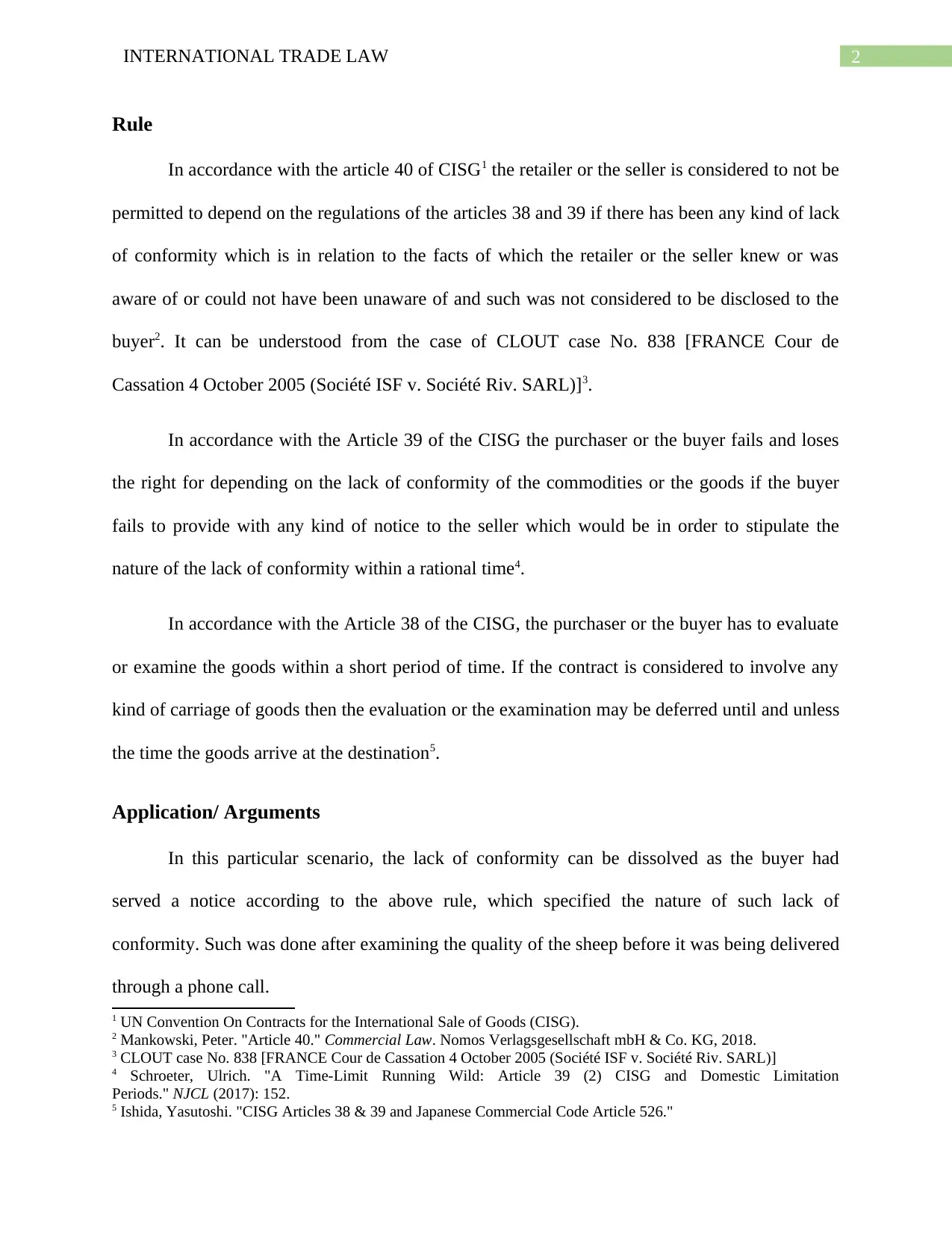
2INTERNATIONAL TRADE LAW
Rule
In accordance with the article 40 of CISG1 the retailer or the seller is considered to not be
permitted to depend on the regulations of the articles 38 and 39 if there has been any kind of lack
of conformity which is in relation to the facts of which the retailer or the seller knew or was
aware of or could not have been unaware of and such was not considered to be disclosed to the
buyer2. It can be understood from the case of CLOUT case No. 838 [FRANCE Cour de
Cassation 4 October 2005 (Société ISF v. Société Riv. SARL)]3.
In accordance with the Article 39 of the CISG the purchaser or the buyer fails and loses
the right for depending on the lack of conformity of the commodities or the goods if the buyer
fails to provide with any kind of notice to the seller which would be in order to stipulate the
nature of the lack of conformity within a rational time4.
In accordance with the Article 38 of the CISG, the purchaser or the buyer has to evaluate
or examine the goods within a short period of time. If the contract is considered to involve any
kind of carriage of goods then the evaluation or the examination may be deferred until and unless
the time the goods arrive at the destination5.
Application/ Arguments
In this particular scenario, the lack of conformity can be dissolved as the buyer had
served a notice according to the above rule, which specified the nature of such lack of
conformity. Such was done after examining the quality of the sheep before it was being delivered
through a phone call.
1 UN Convention On Contracts for the International Sale of Goods (CISG).
2 Mankowski, Peter. "Article 40." Commercial Law. Nomos Verlagsgesellschaft mbH & Co. KG, 2018.
3 CLOUT case No. 838 [FRANCE Cour de Cassation 4 October 2005 (Société ISF v. Société Riv. SARL)]
4 Schroeter, Ulrich. "A Time-Limit Running Wild: Article 39 (2) CISG and Domestic Limitation
Periods." NJCL (2017): 152.
5 Ishida, Yasutoshi. "CISG Articles 38 & 39 and Japanese Commercial Code Article 526."
Rule
In accordance with the article 40 of CISG1 the retailer or the seller is considered to not be
permitted to depend on the regulations of the articles 38 and 39 if there has been any kind of lack
of conformity which is in relation to the facts of which the retailer or the seller knew or was
aware of or could not have been unaware of and such was not considered to be disclosed to the
buyer2. It can be understood from the case of CLOUT case No. 838 [FRANCE Cour de
Cassation 4 October 2005 (Société ISF v. Société Riv. SARL)]3.
In accordance with the Article 39 of the CISG the purchaser or the buyer fails and loses
the right for depending on the lack of conformity of the commodities or the goods if the buyer
fails to provide with any kind of notice to the seller which would be in order to stipulate the
nature of the lack of conformity within a rational time4.
In accordance with the Article 38 of the CISG, the purchaser or the buyer has to evaluate
or examine the goods within a short period of time. If the contract is considered to involve any
kind of carriage of goods then the evaluation or the examination may be deferred until and unless
the time the goods arrive at the destination5.
Application/ Arguments
In this particular scenario, the lack of conformity can be dissolved as the buyer had
served a notice according to the above rule, which specified the nature of such lack of
conformity. Such was done after examining the quality of the sheep before it was being delivered
through a phone call.
1 UN Convention On Contracts for the International Sale of Goods (CISG).
2 Mankowski, Peter. "Article 40." Commercial Law. Nomos Verlagsgesellschaft mbH & Co. KG, 2018.
3 CLOUT case No. 838 [FRANCE Cour de Cassation 4 October 2005 (Société ISF v. Société Riv. SARL)]
4 Schroeter, Ulrich. "A Time-Limit Running Wild: Article 39 (2) CISG and Domestic Limitation
Periods." NJCL (2017): 152.
5 Ishida, Yasutoshi. "CISG Articles 38 & 39 and Japanese Commercial Code Article 526."
⊘ This is a preview!⊘
Do you want full access?
Subscribe today to unlock all pages.

Trusted by 1+ million students worldwide
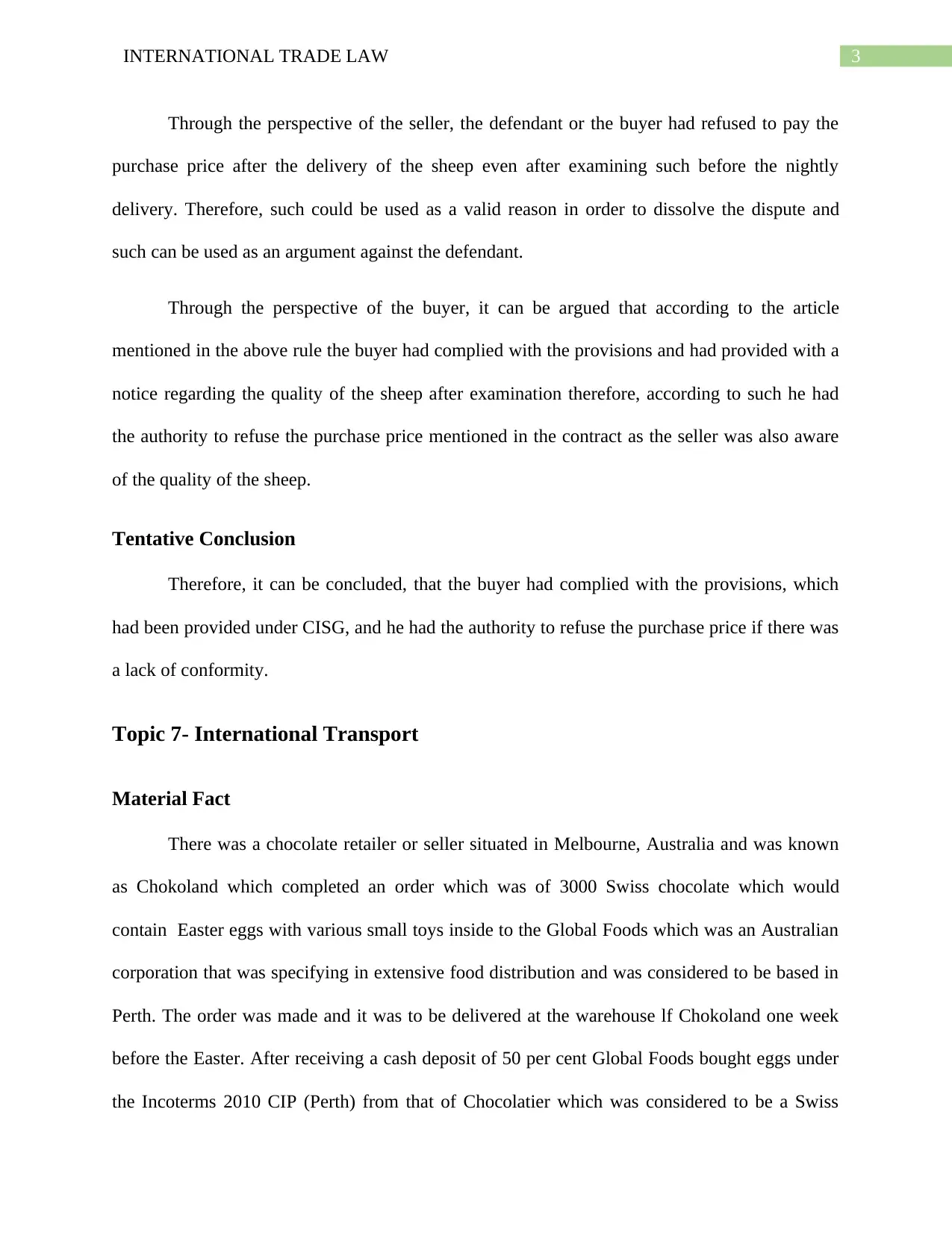
3INTERNATIONAL TRADE LAW
Through the perspective of the seller, the defendant or the buyer had refused to pay the
purchase price after the delivery of the sheep even after examining such before the nightly
delivery. Therefore, such could be used as a valid reason in order to dissolve the dispute and
such can be used as an argument against the defendant.
Through the perspective of the buyer, it can be argued that according to the article
mentioned in the above rule the buyer had complied with the provisions and had provided with a
notice regarding the quality of the sheep after examination therefore, according to such he had
the authority to refuse the purchase price mentioned in the contract as the seller was also aware
of the quality of the sheep.
Tentative Conclusion
Therefore, it can be concluded, that the buyer had complied with the provisions, which
had been provided under CISG, and he had the authority to refuse the purchase price if there was
a lack of conformity.
Topic 7- International Transport
Material Fact
There was a chocolate retailer or seller situated in Melbourne, Australia and was known
as Chokoland which completed an order which was of 3000 Swiss chocolate which would
contain Easter eggs with various small toys inside to the Global Foods which was an Australian
corporation that was specifying in extensive food distribution and was considered to be based in
Perth. The order was made and it was to be delivered at the warehouse lf Chokoland one week
before the Easter. After receiving a cash deposit of 50 per cent Global Foods bought eggs under
the Incoterms 2010 CIP (Perth) from that of Chocolatier which was considered to be a Swiss
Through the perspective of the seller, the defendant or the buyer had refused to pay the
purchase price after the delivery of the sheep even after examining such before the nightly
delivery. Therefore, such could be used as a valid reason in order to dissolve the dispute and
such can be used as an argument against the defendant.
Through the perspective of the buyer, it can be argued that according to the article
mentioned in the above rule the buyer had complied with the provisions and had provided with a
notice regarding the quality of the sheep after examination therefore, according to such he had
the authority to refuse the purchase price mentioned in the contract as the seller was also aware
of the quality of the sheep.
Tentative Conclusion
Therefore, it can be concluded, that the buyer had complied with the provisions, which
had been provided under CISG, and he had the authority to refuse the purchase price if there was
a lack of conformity.
Topic 7- International Transport
Material Fact
There was a chocolate retailer or seller situated in Melbourne, Australia and was known
as Chokoland which completed an order which was of 3000 Swiss chocolate which would
contain Easter eggs with various small toys inside to the Global Foods which was an Australian
corporation that was specifying in extensive food distribution and was considered to be based in
Perth. The order was made and it was to be delivered at the warehouse lf Chokoland one week
before the Easter. After receiving a cash deposit of 50 per cent Global Foods bought eggs under
the Incoterms 2010 CIP (Perth) from that of Chocolatier which was considered to be a Swiss
Paraphrase This Document
Need a fresh take? Get an instant paraphrase of this document with our AI Paraphraser
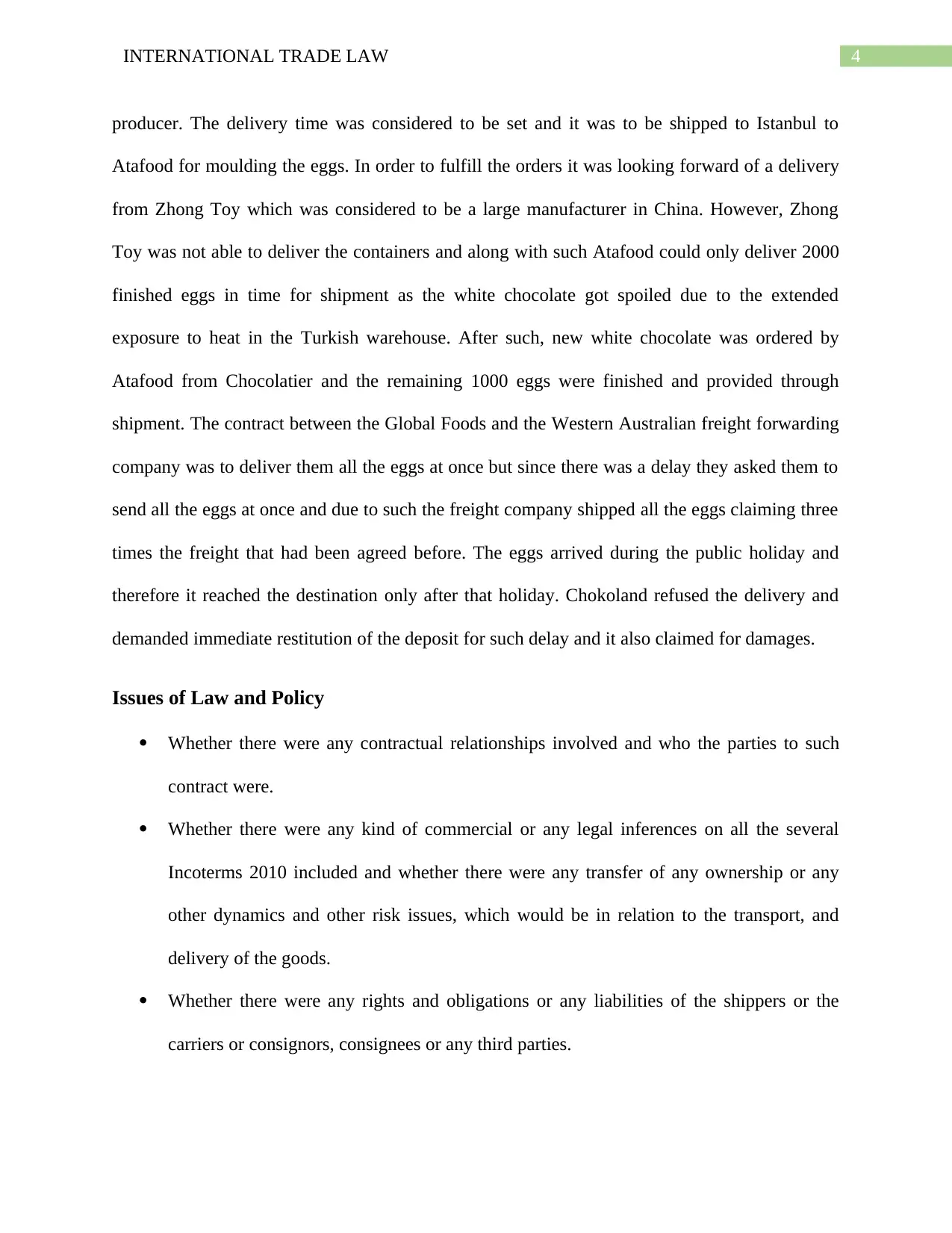
4INTERNATIONAL TRADE LAW
producer. The delivery time was considered to be set and it was to be shipped to Istanbul to
Atafood for moulding the eggs. In order to fulfill the orders it was looking forward of a delivery
from Zhong Toy which was considered to be a large manufacturer in China. However, Zhong
Toy was not able to deliver the containers and along with such Atafood could only deliver 2000
finished eggs in time for shipment as the white chocolate got spoiled due to the extended
exposure to heat in the Turkish warehouse. After such, new white chocolate was ordered by
Atafood from Chocolatier and the remaining 1000 eggs were finished and provided through
shipment. The contract between the Global Foods and the Western Australian freight forwarding
company was to deliver them all the eggs at once but since there was a delay they asked them to
send all the eggs at once and due to such the freight company shipped all the eggs claiming three
times the freight that had been agreed before. The eggs arrived during the public holiday and
therefore it reached the destination only after that holiday. Chokoland refused the delivery and
demanded immediate restitution of the deposit for such delay and it also claimed for damages.
Issues of Law and Policy
Whether there were any contractual relationships involved and who the parties to such
contract were.
Whether there were any kind of commercial or any legal inferences on all the several
Incoterms 2010 included and whether there were any transfer of any ownership or any
other dynamics and other risk issues, which would be in relation to the transport, and
delivery of the goods.
Whether there were any rights and obligations or any liabilities of the shippers or the
carriers or consignors, consignees or any third parties.
producer. The delivery time was considered to be set and it was to be shipped to Istanbul to
Atafood for moulding the eggs. In order to fulfill the orders it was looking forward of a delivery
from Zhong Toy which was considered to be a large manufacturer in China. However, Zhong
Toy was not able to deliver the containers and along with such Atafood could only deliver 2000
finished eggs in time for shipment as the white chocolate got spoiled due to the extended
exposure to heat in the Turkish warehouse. After such, new white chocolate was ordered by
Atafood from Chocolatier and the remaining 1000 eggs were finished and provided through
shipment. The contract between the Global Foods and the Western Australian freight forwarding
company was to deliver them all the eggs at once but since there was a delay they asked them to
send all the eggs at once and due to such the freight company shipped all the eggs claiming three
times the freight that had been agreed before. The eggs arrived during the public holiday and
therefore it reached the destination only after that holiday. Chokoland refused the delivery and
demanded immediate restitution of the deposit for such delay and it also claimed for damages.
Issues of Law and Policy
Whether there were any contractual relationships involved and who the parties to such
contract were.
Whether there were any kind of commercial or any legal inferences on all the several
Incoterms 2010 included and whether there were any transfer of any ownership or any
other dynamics and other risk issues, which would be in relation to the transport, and
delivery of the goods.
Whether there were any rights and obligations or any liabilities of the shippers or the
carriers or consignors, consignees or any third parties.
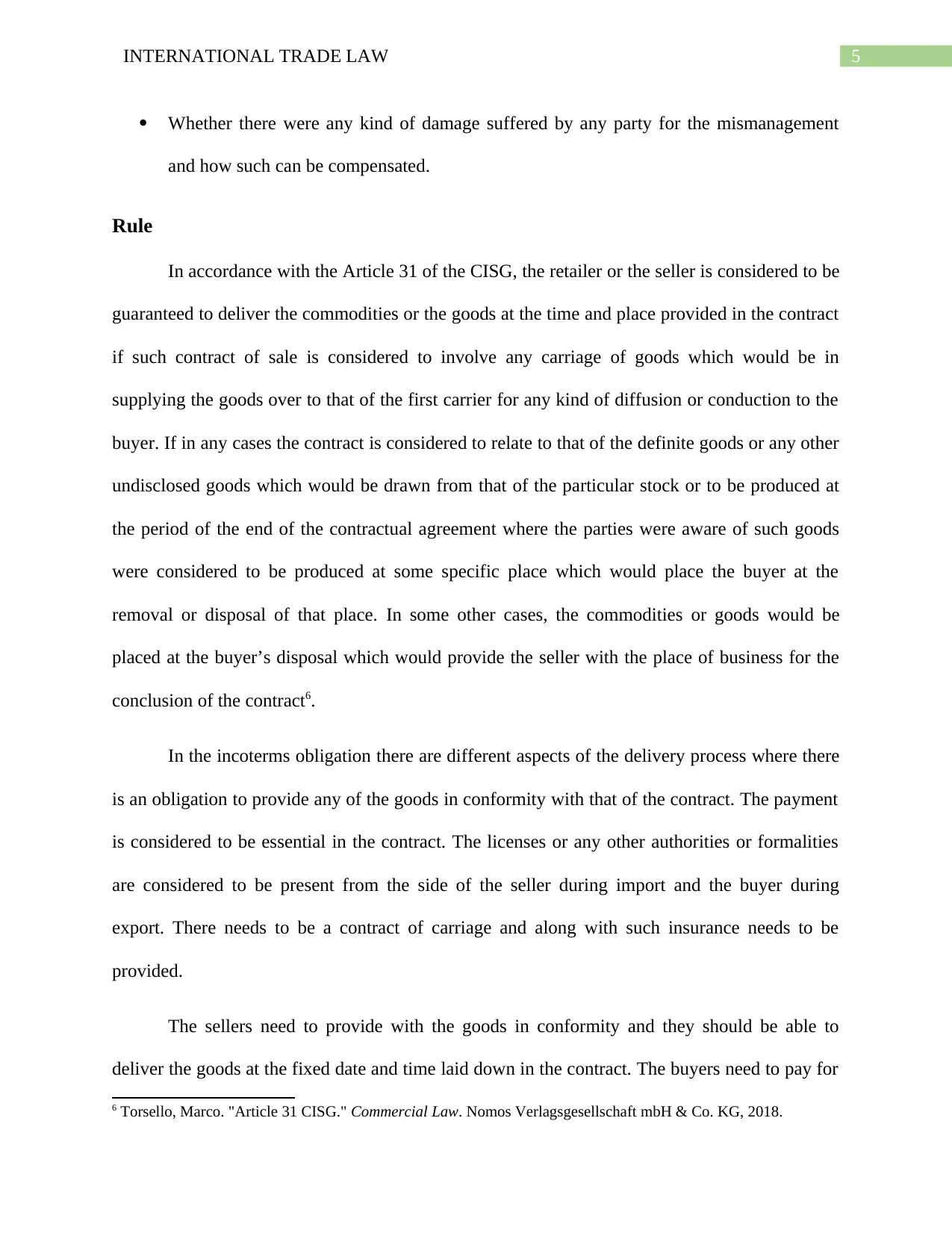
5INTERNATIONAL TRADE LAW
Whether there were any kind of damage suffered by any party for the mismanagement
and how such can be compensated.
Rule
In accordance with the Article 31 of the CISG, the retailer or the seller is considered to be
guaranteed to deliver the commodities or the goods at the time and place provided in the contract
if such contract of sale is considered to involve any carriage of goods which would be in
supplying the goods over to that of the first carrier for any kind of diffusion or conduction to the
buyer. If in any cases the contract is considered to relate to that of the definite goods or any other
undisclosed goods which would be drawn from that of the particular stock or to be produced at
the period of the end of the contractual agreement where the parties were aware of such goods
were considered to be produced at some specific place which would place the buyer at the
removal or disposal of that place. In some other cases, the commodities or goods would be
placed at the buyer’s disposal which would provide the seller with the place of business for the
conclusion of the contract6.
In the incoterms obligation there are different aspects of the delivery process where there
is an obligation to provide any of the goods in conformity with that of the contract. The payment
is considered to be essential in the contract. The licenses or any other authorities or formalities
are considered to be present from the side of the seller during import and the buyer during
export. There needs to be a contract of carriage and along with such insurance needs to be
provided.
The sellers need to provide with the goods in conformity and they should be able to
deliver the goods at the fixed date and time laid down in the contract. The buyers need to pay for
6 Torsello, Marco. "Article 31 CISG." Commercial Law. Nomos Verlagsgesellschaft mbH & Co. KG, 2018.
Whether there were any kind of damage suffered by any party for the mismanagement
and how such can be compensated.
Rule
In accordance with the Article 31 of the CISG, the retailer or the seller is considered to be
guaranteed to deliver the commodities or the goods at the time and place provided in the contract
if such contract of sale is considered to involve any carriage of goods which would be in
supplying the goods over to that of the first carrier for any kind of diffusion or conduction to the
buyer. If in any cases the contract is considered to relate to that of the definite goods or any other
undisclosed goods which would be drawn from that of the particular stock or to be produced at
the period of the end of the contractual agreement where the parties were aware of such goods
were considered to be produced at some specific place which would place the buyer at the
removal or disposal of that place. In some other cases, the commodities or goods would be
placed at the buyer’s disposal which would provide the seller with the place of business for the
conclusion of the contract6.
In the incoterms obligation there are different aspects of the delivery process where there
is an obligation to provide any of the goods in conformity with that of the contract. The payment
is considered to be essential in the contract. The licenses or any other authorities or formalities
are considered to be present from the side of the seller during import and the buyer during
export. There needs to be a contract of carriage and along with such insurance needs to be
provided.
The sellers need to provide with the goods in conformity and they should be able to
deliver the goods at the fixed date and time laid down in the contract. The buyers need to pay for
6 Torsello, Marco. "Article 31 CISG." Commercial Law. Nomos Verlagsgesellschaft mbH & Co. KG, 2018.
⊘ This is a preview!⊘
Do you want full access?
Subscribe today to unlock all pages.

Trusted by 1+ million students worldwide
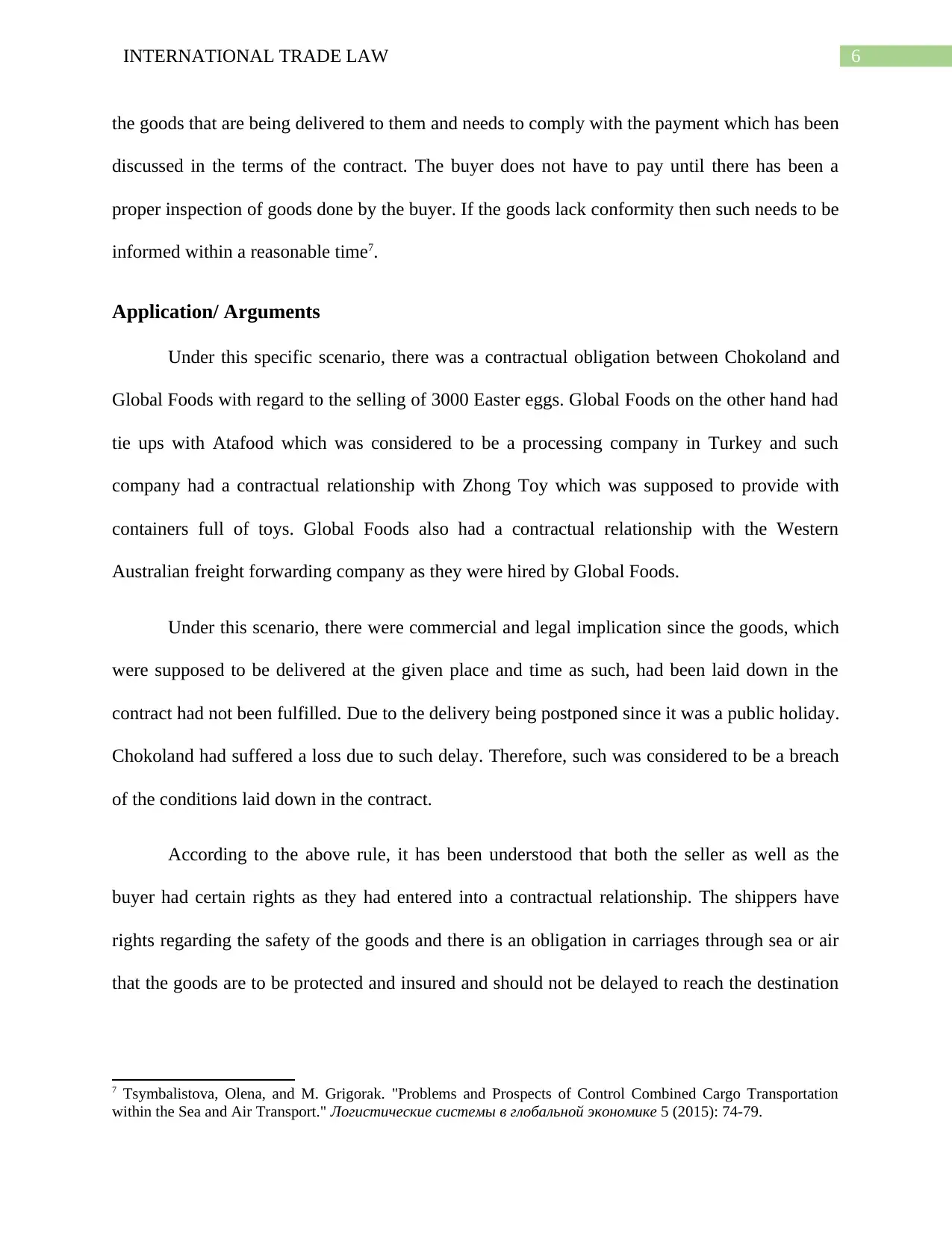
6INTERNATIONAL TRADE LAW
the goods that are being delivered to them and needs to comply with the payment which has been
discussed in the terms of the contract. The buyer does not have to pay until there has been a
proper inspection of goods done by the buyer. If the goods lack conformity then such needs to be
informed within a reasonable time7.
Application/ Arguments
Under this specific scenario, there was a contractual obligation between Chokoland and
Global Foods with regard to the selling of 3000 Easter eggs. Global Foods on the other hand had
tie ups with Atafood which was considered to be a processing company in Turkey and such
company had a contractual relationship with Zhong Toy which was supposed to provide with
containers full of toys. Global Foods also had a contractual relationship with the Western
Australian freight forwarding company as they were hired by Global Foods.
Under this scenario, there were commercial and legal implication since the goods, which
were supposed to be delivered at the given place and time as such, had been laid down in the
contract had not been fulfilled. Due to the delivery being postponed since it was a public holiday.
Chokoland had suffered a loss due to such delay. Therefore, such was considered to be a breach
of the conditions laid down in the contract.
According to the above rule, it has been understood that both the seller as well as the
buyer had certain rights as they had entered into a contractual relationship. The shippers have
rights regarding the safety of the goods and there is an obligation in carriages through sea or air
that the goods are to be protected and insured and should not be delayed to reach the destination
7 Tsymbalistova, Olena, and M. Grigorak. "Problems and Prospects of Control Combined Cargo Transportation
within the Sea and Air Transport." Логистические системы в глобальной экономике 5 (2015): 74-79.
the goods that are being delivered to them and needs to comply with the payment which has been
discussed in the terms of the contract. The buyer does not have to pay until there has been a
proper inspection of goods done by the buyer. If the goods lack conformity then such needs to be
informed within a reasonable time7.
Application/ Arguments
Under this specific scenario, there was a contractual obligation between Chokoland and
Global Foods with regard to the selling of 3000 Easter eggs. Global Foods on the other hand had
tie ups with Atafood which was considered to be a processing company in Turkey and such
company had a contractual relationship with Zhong Toy which was supposed to provide with
containers full of toys. Global Foods also had a contractual relationship with the Western
Australian freight forwarding company as they were hired by Global Foods.
Under this scenario, there were commercial and legal implication since the goods, which
were supposed to be delivered at the given place and time as such, had been laid down in the
contract had not been fulfilled. Due to the delivery being postponed since it was a public holiday.
Chokoland had suffered a loss due to such delay. Therefore, such was considered to be a breach
of the conditions laid down in the contract.
According to the above rule, it has been understood that both the seller as well as the
buyer had certain rights as they had entered into a contractual relationship. The shippers have
rights regarding the safety of the goods and there is an obligation in carriages through sea or air
that the goods are to be protected and insured and should not be delayed to reach the destination
7 Tsymbalistova, Olena, and M. Grigorak. "Problems and Prospects of Control Combined Cargo Transportation
within the Sea and Air Transport." Логистические системы в глобальной экономике 5 (2015): 74-79.
Paraphrase This Document
Need a fresh take? Get an instant paraphrase of this document with our AI Paraphraser
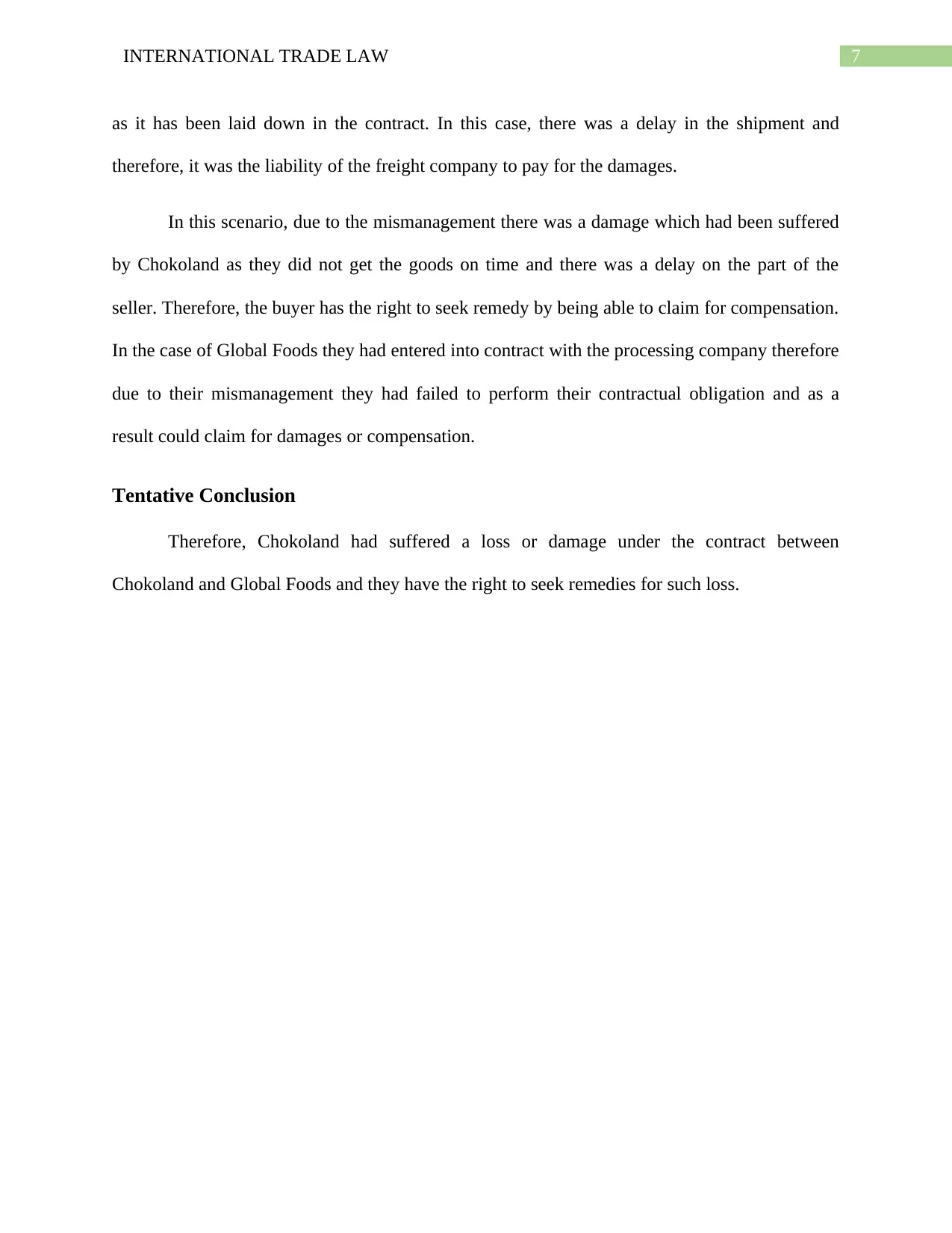
7INTERNATIONAL TRADE LAW
as it has been laid down in the contract. In this case, there was a delay in the shipment and
therefore, it was the liability of the freight company to pay for the damages.
In this scenario, due to the mismanagement there was a damage which had been suffered
by Chokoland as they did not get the goods on time and there was a delay on the part of the
seller. Therefore, the buyer has the right to seek remedy by being able to claim for compensation.
In the case of Global Foods they had entered into contract with the processing company therefore
due to their mismanagement they had failed to perform their contractual obligation and as a
result could claim for damages or compensation.
Tentative Conclusion
Therefore, Chokoland had suffered a loss or damage under the contract between
Chokoland and Global Foods and they have the right to seek remedies for such loss.
as it has been laid down in the contract. In this case, there was a delay in the shipment and
therefore, it was the liability of the freight company to pay for the damages.
In this scenario, due to the mismanagement there was a damage which had been suffered
by Chokoland as they did not get the goods on time and there was a delay on the part of the
seller. Therefore, the buyer has the right to seek remedy by being able to claim for compensation.
In the case of Global Foods they had entered into contract with the processing company therefore
due to their mismanagement they had failed to perform their contractual obligation and as a
result could claim for damages or compensation.
Tentative Conclusion
Therefore, Chokoland had suffered a loss or damage under the contract between
Chokoland and Global Foods and they have the right to seek remedies for such loss.
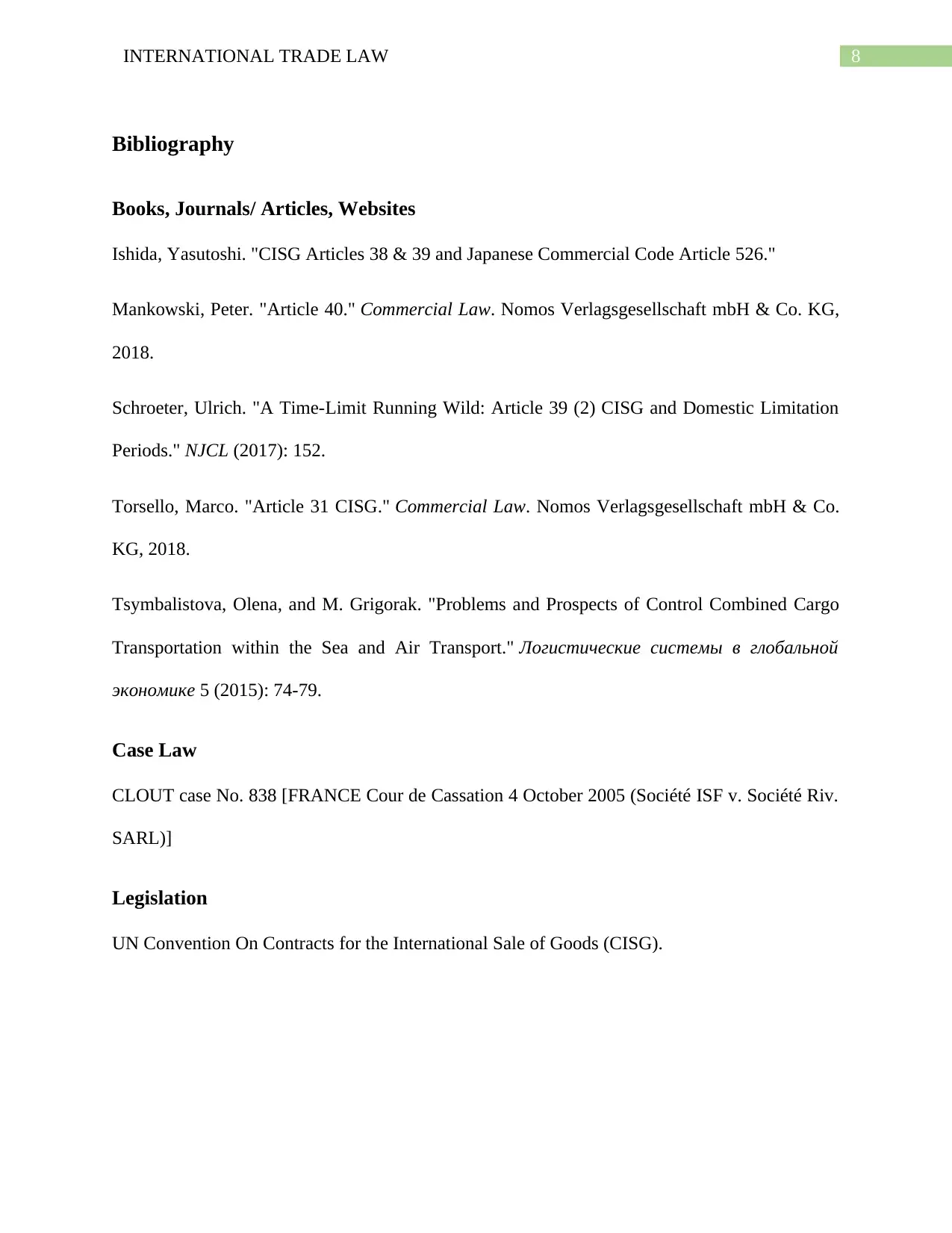
8INTERNATIONAL TRADE LAW
Bibliography
Books, Journals/ Articles, Websites
Ishida, Yasutoshi. "CISG Articles 38 & 39 and Japanese Commercial Code Article 526."
Mankowski, Peter. "Article 40." Commercial Law. Nomos Verlagsgesellschaft mbH & Co. KG,
2018.
Schroeter, Ulrich. "A Time-Limit Running Wild: Article 39 (2) CISG and Domestic Limitation
Periods." NJCL (2017): 152.
Torsello, Marco. "Article 31 CISG." Commercial Law. Nomos Verlagsgesellschaft mbH & Co.
KG, 2018.
Tsymbalistova, Olena, and M. Grigorak. "Problems and Prospects of Control Combined Cargo
Transportation within the Sea and Air Transport." Логистические системы в глобальной
экономике 5 (2015): 74-79.
Case Law
CLOUT case No. 838 [FRANCE Cour de Cassation 4 October 2005 (Société ISF v. Société Riv.
SARL)]
Legislation
UN Convention On Contracts for the International Sale of Goods (CISG).
Bibliography
Books, Journals/ Articles, Websites
Ishida, Yasutoshi. "CISG Articles 38 & 39 and Japanese Commercial Code Article 526."
Mankowski, Peter. "Article 40." Commercial Law. Nomos Verlagsgesellschaft mbH & Co. KG,
2018.
Schroeter, Ulrich. "A Time-Limit Running Wild: Article 39 (2) CISG and Domestic Limitation
Periods." NJCL (2017): 152.
Torsello, Marco. "Article 31 CISG." Commercial Law. Nomos Verlagsgesellschaft mbH & Co.
KG, 2018.
Tsymbalistova, Olena, and M. Grigorak. "Problems and Prospects of Control Combined Cargo
Transportation within the Sea and Air Transport." Логистические системы в глобальной
экономике 5 (2015): 74-79.
Case Law
CLOUT case No. 838 [FRANCE Cour de Cassation 4 October 2005 (Société ISF v. Société Riv.
SARL)]
Legislation
UN Convention On Contracts for the International Sale of Goods (CISG).
⊘ This is a preview!⊘
Do you want full access?
Subscribe today to unlock all pages.

Trusted by 1+ million students worldwide
1 out of 9
Related Documents
Your All-in-One AI-Powered Toolkit for Academic Success.
+13062052269
info@desklib.com
Available 24*7 on WhatsApp / Email
![[object Object]](/_next/static/media/star-bottom.7253800d.svg)
Unlock your academic potential
Copyright © 2020–2026 A2Z Services. All Rights Reserved. Developed and managed by ZUCOL.




